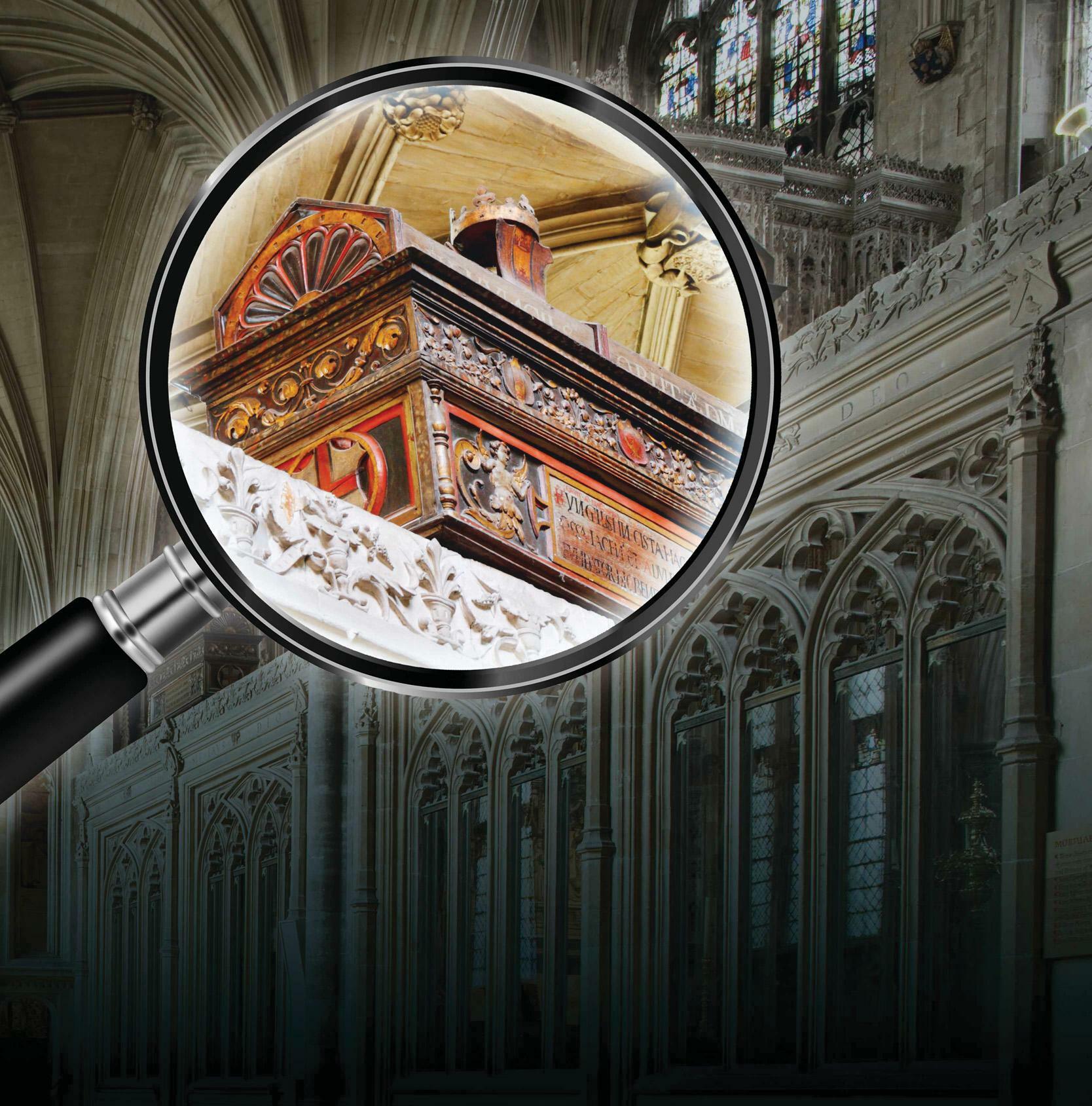Try GOLD - Free
An Anglo-Saxon detective story
BBC History UK
|November 2023
Why do the bones of luminaries such as King Cnut, Emma of Normandy and William II lie mixed up in six chests in Winchester Cathedral? And what do these remains tell us about the evolution of early England? Cat Jarman investigates

It’s the morning of 14 December 1642, and the city of Winchester is quiet. Inside the cathedral, the clergy are painfully aware of a looming threat outside. Two days earlier, parliamentarian soldiers had entered the city, snatching horses and looting the town.
In the midst of a civil war dividing the country into those who support the king and those who are for parliament, religious institutions are especially at risk, because power and religion lie at the heart of the conflict. So when, on that December morning, soldiers smash through the cathedral’s great west door, the clergy are appalled but not surprised. They watch in terror as the troops storm the nave with colours flying, drums beating and torches lit, some even riding on horseback.
Over the hours that follow, the building is desecrated. Eventually, the soldiers turn their attention to the tops of the finely carved stone screens that surround the central presbytery, the cathedral’s beating heart. There on a ledge sit 10 neatly spaced wooden chests, placed up high by Richard Fox, bishop of Winchester, in the 1520s. The remains of King Cnut and his wife Emma lie within the chests, as do those of Ecgberht and numerous other West Saxon kings, along with William II and various venerated bishops.
The troops climb up to the chests and rifle through them callously, smashing some on the cold stone tiles. Observers watch in shock as the soldiers pick up the bones and hurl them at the beautifully crafted stained-glass windows that adorn the cathedral. It is only hours later, recovering from their terror, that the clergy begin to pick through the detritus of the onslaught, attempting to return what remains to a safe place once again.

A tragic tale
This story is from the November 2023 edition of BBC History UK.
Subscribe to Magzter GOLD to access thousands of curated premium stories, and 10,000+ magazines and newspapers.
Already a subscriber? Sign In
MORE STORIES FROM BBC History UK

BBC History UK
On the skids
Richard Rodgers and Oscar Hammerstein II's smash musical Oklahoma! opened on Broadway on 31 March 1943.
1 min
Christmas 2025

BBC History UK
Small pleasures
Memory is imperfect, but what if you could get a professional model maker to recreate a moment from the past?
1 min
Christmas 2025

BBC History UK
Bath in five places
In the Georgian era, Bath became arguably Britain's most fashionable destination. KIRSTEN ELLIOTT promenades five historic highlights
3 mins
Christmas 2025

BBC History UK
End times
Why do civilisations that dominated their epoch fail? In an era of autocracy, climate change, the rise of Al and a first-hand understanding of how deadly pandemics can be, it's a question that seems pertinent.
1 min
Christmas 2025

BBC History UK
What are the origins of the Yule Lads?
To learn about the Jólasveinar (Yule Lads), we must start with their mother, the terrifying ogress Grýla. Her name appeared in Icelandic texts as early as the 13th century, although it wasn’t until later that those 13 mischievous lads became associated with her. Folk tales and poems tell how she descends from the mountains with an empty sack to stuff full of children. Grýla owns the monstrous Jólaköttur (Yule Cat), which roams the countryside on Christmas Eve, searching for children to gobble up if they're not wearing new clothes.
1 mins
Christmas 2025

BBC History UK
Santa Claus v Father Christmas
The true identity of the white-bearded, red-robed figure who fills children's stockings at Christmas has long been debated. Thomas Ruys Smith sizes up the merry contenders
8 mins
Christmas 2025

BBC History UK
Frontier friction
Set in Washington Territory in 1854, The Abandons is a Western that's unusual for having two matriarchs, women whose lives become entangled, at its centre.
1 min
Christmas 2025

BBC History UK
The Last Days of Pompeii: The Immersive Experience
Delve into the culture of daily Roman life, witness the momentous eruption of Mount Vesuvius, and follow its fallout in Immerse LDN's new exhibition. In a blend of cutting-edge technology and vivid storytelling, this exhibition launches visitors into Pompeii's rich history with recreations of the ancient city's beautiful pre-eruption landscape, a 360-degree virtual reality Roman amphitheatre experience, and a digital metaverse recreating Pompeii's 'Villa of Mysteries'.
1 min
Christmas 2025

BBC History UK
Elizabeth Marsh The corsair's captive
Taken hostage by a Barbary ship's captain in the 18th century, a young Englishwoman found herself fighting for her freedom in Marrakech. ADAM NICHOLS introduces a brave captive who later wrote a book about her dramatic experiences
6 mins
Christmas 2025

BBC History UK
29 DECEMBER 1170: Thomas Becket is murdered in Canterbury
Knights loyal to Henry II rid him of the “low-born cleric”
2 mins
Christmas 2025
Translate
Change font size

